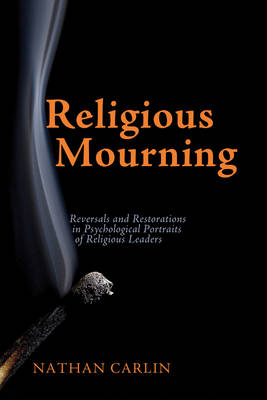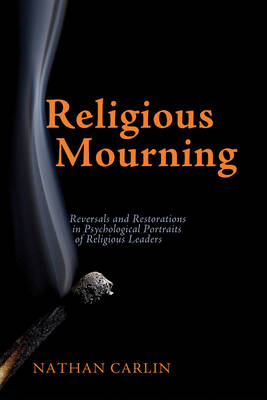
Bedankt voor het vertrouwen het afgelopen jaar! Om jou te bedanken bieden we GRATIS verzending (in België) aan op alles gedurende de hele maand januari.
- Afhalen na 1 uur in een winkel met voorraad
- In januari gratis thuislevering in België
- Ruim aanbod met 7 miljoen producten
Bedankt voor het vertrouwen het afgelopen jaar! Om jou te bedanken bieden we GRATIS verzending (in België) aan op alles gedurende de hele maand januari.
- Afhalen na 1 uur in een winkel met voorraad
- In januari gratis thuislevering in België
- Ruim aanbod met 7 miljoen producten
Zoeken
Religious Mourning
Reversals and Restorations in Psychological Portraits of Religious Leaders
Nathan Carlin
Paperback | Engels
€ 39,95
+ 79 punten
Uitvoering
Omschrijving
Religious Mourning is about a common experience among those who study religion: religious loss. When people of faith study religion critically, or when life experiences such as death and divorce trigger personal reflection on faith, religious intellectuals often become estranged from their own tradition. Sometimes this estrangement causes them to leave religion altogether. But for those who study religion from a psychological perspective, a certain kind of introspective and iconoclastic religiosity can be revived by means of academic writing. Religious Mourning explores this phenomenon by focusing on psychobiographical writings about religious leaders--including Donald Capps' portrait of Jesus of Nazareth, James Dittes' portrait of Saint Augustine, and William Bouwsma's portrait of John Calvin--to show how these authors' personal lives, and especially their experiences of loss, influence their scholarship. As Capps, Dittes, and Bouwsma subversively scavenge the lives of Jesus, Augustine, and Calvin to reverse and restore a religion that is rich with experience, including (and especially) their own, they invite us to do the same.
Specificaties
Betrokkenen
- Auteur(s):
- Uitgeverij:
Inhoud
- Aantal bladzijden:
- 152
- Taal:
- Engels
Eigenschappen
- Productcode (EAN):
- 9781620326480
- Verschijningsdatum:
- 24/04/2014
- Uitvoering:
- Paperback
- Formaat:
- Trade paperback (VS)
- Afmetingen:
- 152 mm x 226 mm
- Gewicht:
- 226 g

Alleen bij Standaard Boekhandel
+ 79 punten op je klantenkaart van Standaard Boekhandel
Beoordelingen
We publiceren alleen reviews die voldoen aan de voorwaarden voor reviews. Bekijk onze voorwaarden voor reviews.









